Are you tired of waking up to find your kitchen in disarray, with trash cans overturned and food scattered everywhere?
If so, you may be dealing with pantry raiders like raccoons and opossums. These nocturnal omnivores are notorious for their scavenging tendencies, and can wreak havoc on your property if left unchecked.
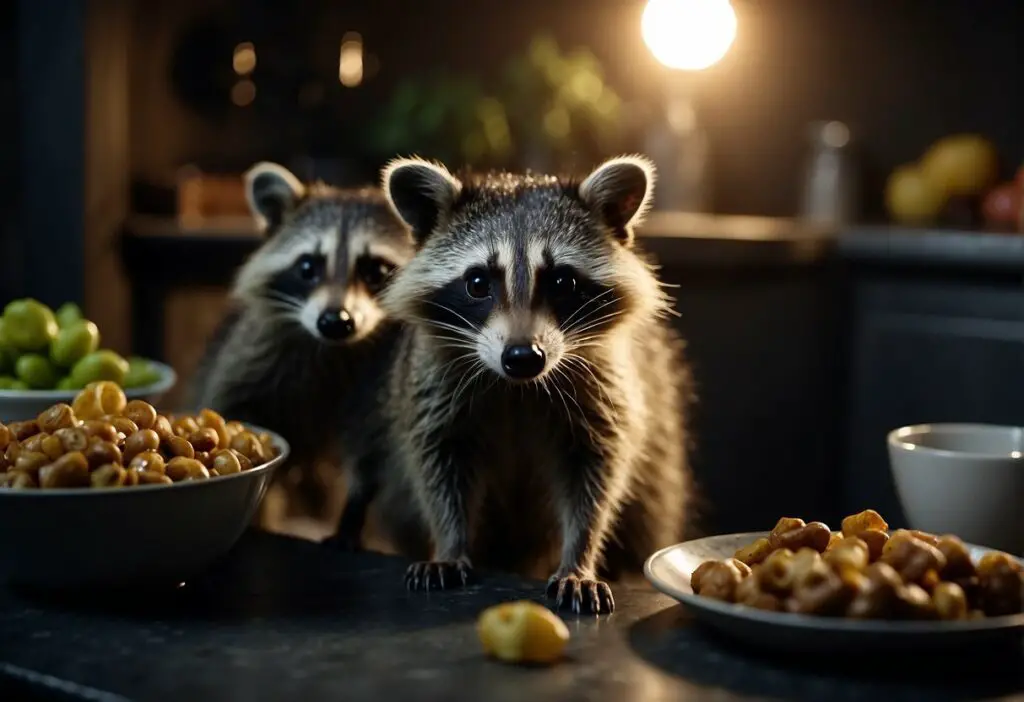
Fortunately, there are several strategies you can use to keep these critters out of your kitchen. Securing trash cans, compost bins, and pet food storage is one of the most effective ways to deter pantry raiders. You can invest in locking lids or bungee cords to keep raccoons and opossums from accessing your garbage. Additionally, storing pet food indoors or in a sealed container can help prevent these animals from being attracted to your property.
In addition to securing your trash and pet food, there are other methods you can use to deter raccoons and opossums. These animals are sensitive to light and sound, so using motion-activated lights or playing music can help keep them away. You can also try natural repellents like vinegar or ammonia, which can be sprayed around the perimeter of your property to discourage these animals from coming near. With a little effort and persistence, you can keep pantry raiders at bay and enjoy a clean, tidy kitchen.
Understanding Raccoon and Opossum Behavior
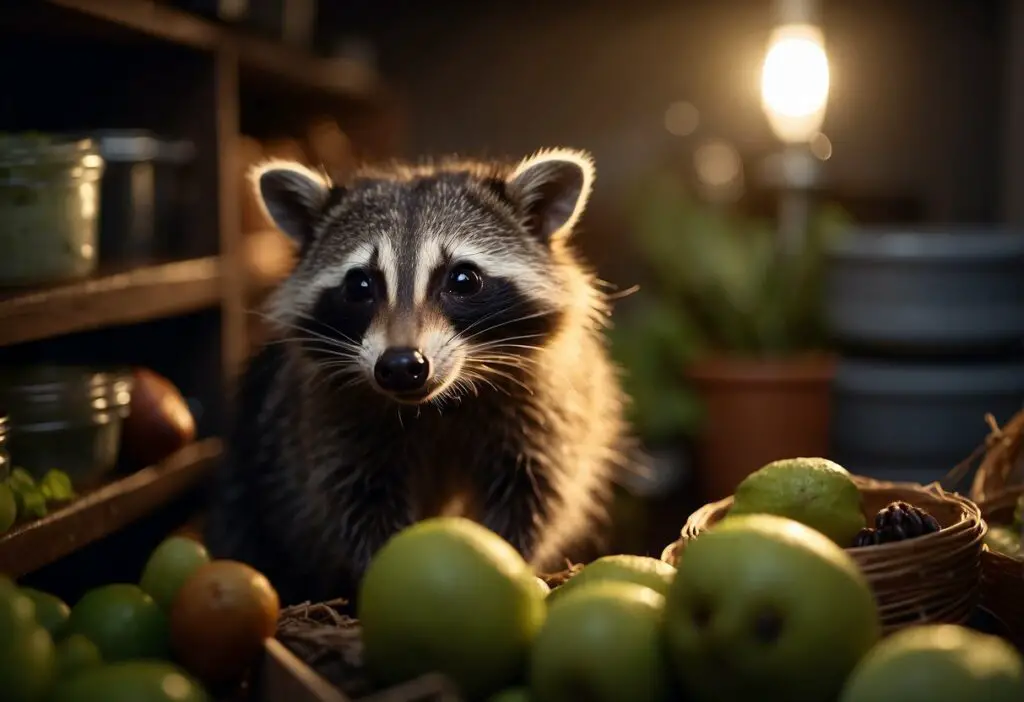
Nocturnal Activities and Diet
Raccoons and opossums are primarily nocturnal animals, meaning they are most active during the night. They are omnivores, which means they eat both plants and animals. Their diet typically includes insects, fruit, plants, eggs, frogs, fish, and rodents. Raccoons are known to be opportunistic feeders and will eat almost anything they can find, including garbage and pet food left outside. Opossums, on the other hand, are scavengers and will eat dead animals and insects.
Natural Habitats and Adaptations
Raccoons and opossums are adaptable animals and can be found in a variety of habitats, including forests, suburban areas, and even cities. They are excellent climbers and can easily scale trees and fences to access food sources. Raccoons have a unique adaptation in their paws that allows them to manipulate objects, similar to human hands. This allows them to open lids and containers to access food. Opossums, on the other hand, have a prehensile tail that allows them to grasp and hold onto branches while climbing.
To keep raccoons and opossums out of your kitchen, it is important to secure your trash cans, compost bins, and pet food storage. Make sure your trash cans have tight-fitting lids and are stored in a secure area. Avoid leaving pet food outside overnight and store it in a secure container. You can also use light, sound, and natural repellents to deter these animals from entering your property. Motion-activated lights and loud noises can startle them and make them think twice about entering your property. Natural repellents, such as vinegar, cayenne pepper, and predator urine, can also be effective in deterring these animals. By understanding their behavior and taking preventative measures, you can keep raccoons and opossums out of your kitchen and away from your property.
Securing Your Home and Garden
Trash and Compost Management
Trash and compost bins are a major attraction for raccoons and opossums. To prevent them from raiding your pantry, it is important to secure your trash and compost bins. Here are some tips that can help:
- Use a sturdy trash can with a tight-fitting lid. Raccoons and opossums can easily knock over flimsy trash cans and pry open loose lids.
- Store your trash cans in a secure location, such as a garage or shed. If you have to keep them outside, make sure they are in a well-lit area.
- Clean your trash cans regularly to remove any food residue or odors that may attract raccoons and opossums.
- Use a bungee cord or a lock to secure the lid of your trash can. This will prevent raccoons and opossums from prying it open.
When it comes to compost bins, the same rules apply. Here are some additional tips:
- Use a compost bin with a tight-fitting lid to prevent raccoons and opossums from accessing it.
- Avoid adding meat, dairy, or cooked food to your compost bin. These items can attract raccoons and opossums.
- Turn your compost regularly to speed up the decomposition process and reduce odors that may attract raccoons and opossums.
Protecting Pet Food and Bird Feeders
Raccoons and opossums are also attracted to pet food and bird feeders. Here are some tips to keep them away:
- Store pet food indoors in a secure location, such as a pantry or a closet.
- If you have to store pet food outside, use a sturdy container with a tight-fitting lid.
- Clean up spilled birdseed regularly and use a squirrel baffle to prevent raccoons and opossums from climbing up to the feeder.
Fencing and Exclusion Techniques
Fencing is an effective way to keep raccoons and opossums out of your garden. Here are some tips:
- Use a fence that is at least 4 feet tall and buried at least 6 inches deep to prevent raccoons and opossums from digging under it.
- Use wire mesh to cover any gaps or holes in your fence to prevent raccoons and opossums from squeezing through.
- Use exclusion techniques, such as one-way doors, to remove raccoons and opossums that have already taken up residence in your home or garden.
By following these tips, you can keep raccoons and opossums out of your pantry and garden, and enjoy a peaceful coexistence with these nocturnal creatures.
Effective Deterrents and Repellents
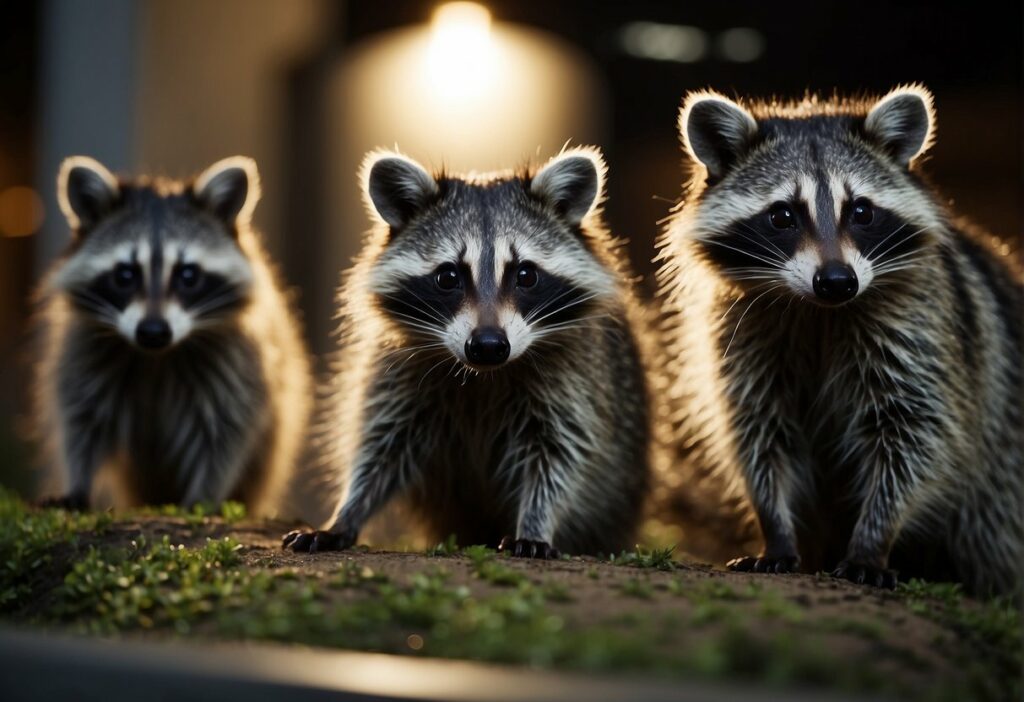
Raccoons and opossums are nocturnal creatures with a strong sense of smell and excellent climbing abilities. They are opportunistic eaters and will scavenge for food in your kitchen, trash cans, compost bins, and pet food storage. To keep these pantry raiders out of your kitchen, you need to take effective measures to deter and repel them.
Using Light and Sound to Your Advantage
Raccoons and opossums are afraid of bright lights and loud sounds. You can use this to your advantage by installing motion-activated lights and ultrasonic sound devices around your home. These devices emit high-frequency sounds that are inaudible to humans but can be heard by these animals. They can effectively keep raccoons and opossums away from your property.
Natural and Commercial Repellents
There are many natural and commercial repellents that you can use to deter raccoons and opossums. Some of the most effective natural repellents include hot pepper, ammonia, and garlic. You can sprinkle these substances around your trash cans, compost bins, and pet food storage to keep these animals away.
Commercial repellents like scents, sprays, and granules can also be effective in keeping raccoons and opossums away. Look for products that contain natural ingredients like peppermint oil, cinnamon, and eucalyptus. These products are safe for the environment and can effectively repel these animals.
In conclusion, keeping raccoons and opossums out of your kitchen requires a multi-faceted approach. You need to secure your trash cans, compost bins, and pet food storage, use light and sound to your advantage, and use natural and commercial repellents. By taking these measures, you can effectively keep these pantry raiders out of your home.
Prevention and Control Strategies
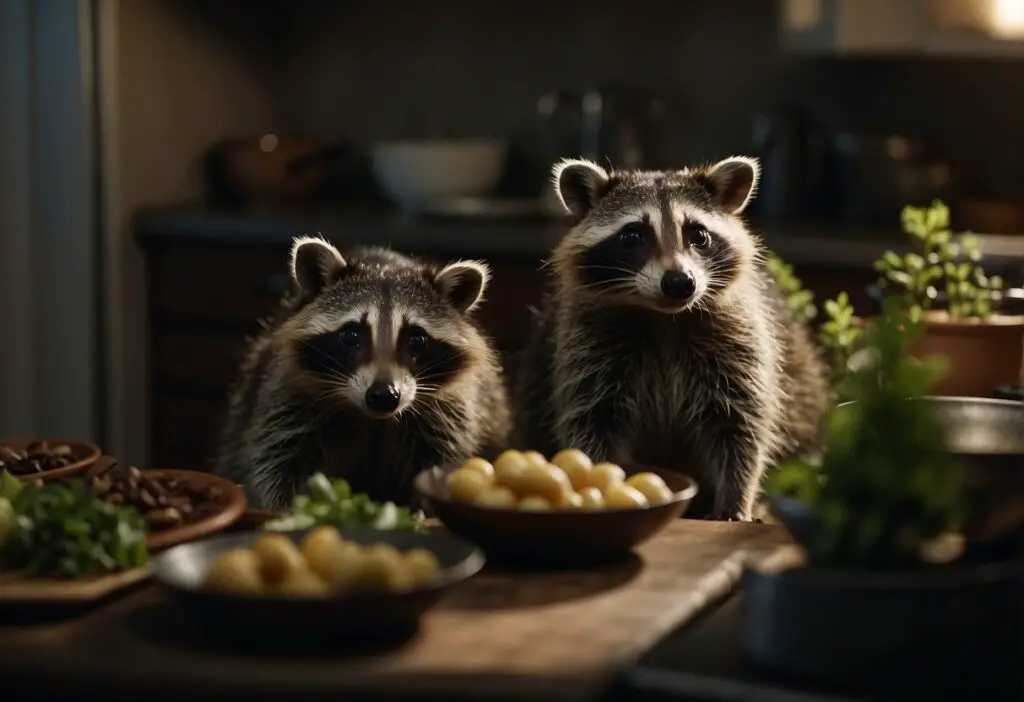
Best Practices for Prevention
Raccoons and opossums are nocturnal creatures with a strong sense of smell, which makes them attracted to food sources in your kitchen. To prevent them from raiding your pantry, follow these best practices for prevention:
- Secure your trash cans with tight-fitting lids and store them inside a secure building, such as a garage or shed. If this is not possible, consider using animal-proof trash cans.
- Use compost bins made of sturdy materials with secure lids to prevent raccoons and opossums from accessing your compost. Avoid adding meat, eggs, fats, or oils to your compost pile, as this can attract scavengers.
- Store pet food in secure containers with tight-fitting lids. Avoid leaving pet food outside overnight, as this can attract raccoons and opossums.
- Keep your yard clean and free of debris. Remove fallen fruit from fruit trees and clean up spilled birdseed or pet food.
When to Call Animal Control
If raccoons or opossums have already invaded your kitchen or home, it may be time to call in the professionals. Licensed wildlife control experts can safely and humanely remove these animals from your property. Local animal control agencies may also be able to assist you with pest control.
It is important to note that trapping and releasing raccoons and opossums on your own can be dangerous and may be illegal in your area. Always consult with a licensed wildlife control expert or local animal control agency before attempting to trap and release these animals on your own.
In addition to prevention and professional pest control, you can also try deterring raccoons and opossums with light, sound, and natural repellents. However, it is important to note that these methods may not be effective in all situations and should be used in conjunction with other prevention and control strategies.
By following these best practices for prevention and knowing when to call in the professionals, you can keep raccoons and opossums out of your kitchen and prevent them from raiding your pantry.
The Pantry Raiders: Keeping Raccoons and Opossums Out of Your Kitchen
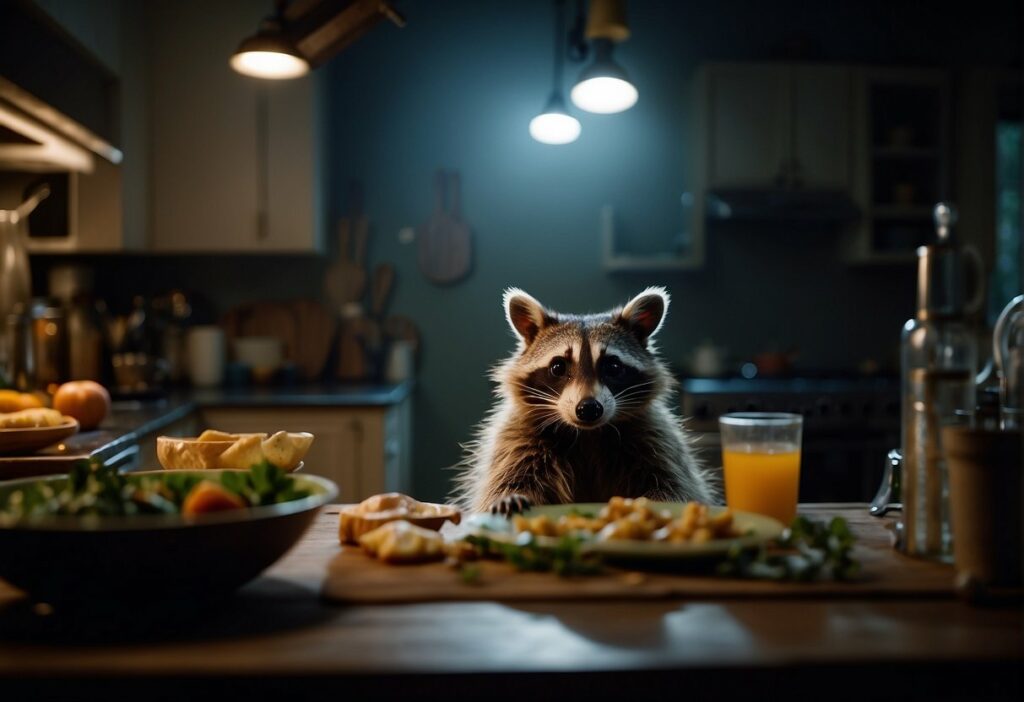
Raccoons and opossums are two of the most common nocturnal animals that can raid your pantry. These omnivores are well-known for their scavenging tendencies and can easily find their way into your kitchen in search of food. Here are some strategies to keep them out:
Securing Trash Cans, Compost Bins, and Pet Food Storage
The first step to keeping raccoons and opossums out of your kitchen is to secure your trash cans, compost bins, and pet food storage. These animals are attracted to the smell of food, so it’s important to keep your garbage and compost bins sealed tightly. Use bungee cords to secure the lids and consider using a lock to keep them closed. Store pet food in airtight containers and avoid leaving food outside overnight.
Deterrents with Light, Sound, and Natural Repellents
Another effective strategy is to use deterrents such as light, sound, and natural repellents. Motion-activated lights can startle raccoons and opossums and make them think twice about approaching your property. You can also use ultrasonic devices that emit high-pitched sounds that are unpleasant for these animals. Natural repellents such as vinegar, hot sauce, and cayenne pepper can also be effective in deterring these pantry raiders.
Living Harmoniously with Wildlife
While it’s important to keep raccoons and opossums out of your kitchen, it’s also important to remember that these animals are part of our urban ecosystem. As urbanization continues, these animals are losing their natural habitats and are forced to seek shelter in structures such as buildings, sheds, and garages. By taking steps to secure your property, you can help prevent damage caused by these animals while also providing them with the space they need to thrive.
If you have climbers on your property such as trees or vines, make sure to trim them regularly to prevent raccoons and opossums from using them to access your home. You can also install barriers such as fences or netting to prevent these animals from getting into your yard.
In conclusion, by taking steps to secure your property and using deterrents such as light, sound, and natural repellents, you can keep raccoons and opossums out of your kitchen. At the same time, it’s important to remember that these animals are part of our urban ecosystem and should be treated with respect and care.



